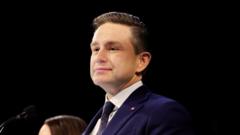As the dust settles after Canada's recent election, the Conservative Party is left reeling from a significant loss, having squandered a commanding 27-point lead in the polls. Leaders and strategists within the party are trading blame and debating the way forward, particularly in light of Pierre Poilievre losing his own constituency seat. Poilievre, the current leader who has been in politics for over two decades, faces pressure to unite the party as he aims to reclaim a seat in an upcoming Alberta special election.
How Canada's Conservatives Lost a 27-Point Lead: The Aftermath of the Election

How Canada's Conservatives Lost a 27-Point Lead: The Aftermath of the Election
Canada's Conservative Party grapples with accountability following a stunning election defeat.
Despite the party securing nearly 42% of the popular vote—the highest since its formation in 2003—the results mark a fourth consecutive election defeat. Conservative figures are concerned about the future direction of their party. In anticipation of a caucus meeting, Poilievre has already announced plans to stand for election in Alberta, as Conservative MP Damien Kurek is set to resign to facilitate his comeback.
Strategists within the party express that Poilievre still retains substantial support amongst his peers. Shakir Chambers affirmed that calls for his ousting are minimal as prominent Conservatives, like former party leader Andrew Scheer, advocate for his stability in leadership for future elections. However, other party members blame the loss on multiple factors, including Ontario leader Doug Ford's failure to align with the federal Conservatives during the campaign.
Ford's handling of his political responsibilities drew criticism, with some suggesting that his actions distracted from the national Conservative agenda. This has intensified calls for introspection within the party, as members highlight the need for a broader appeal that aligns with diverse Canadian values and interests. The party's current trajectory indicates that significant changes will be essential if it hopes to rally disillusioned voters in subsequent elections.
The conversation now shifts to healing internal divisions while bridging gaps between varying Conservative factions in a country known for its diversity. As political dynamics evolve, the focus remains on how effectively the Conservative Party can adapt and unify to regain the trust of the electorate in future contests.
Strategists within the party express that Poilievre still retains substantial support amongst his peers. Shakir Chambers affirmed that calls for his ousting are minimal as prominent Conservatives, like former party leader Andrew Scheer, advocate for his stability in leadership for future elections. However, other party members blame the loss on multiple factors, including Ontario leader Doug Ford's failure to align with the federal Conservatives during the campaign.
Ford's handling of his political responsibilities drew criticism, with some suggesting that his actions distracted from the national Conservative agenda. This has intensified calls for introspection within the party, as members highlight the need for a broader appeal that aligns with diverse Canadian values and interests. The party's current trajectory indicates that significant changes will be essential if it hopes to rally disillusioned voters in subsequent elections.
The conversation now shifts to healing internal divisions while bridging gaps between varying Conservative factions in a country known for its diversity. As political dynamics evolve, the focus remains on how effectively the Conservative Party can adapt and unify to regain the trust of the electorate in future contests.




















